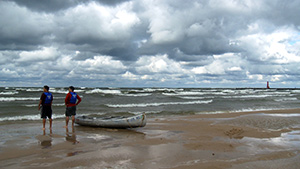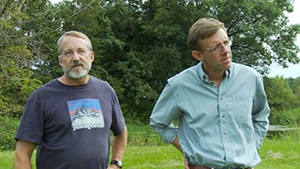They were within seconds of getting washed over the flooded dam in the lower Fox River. Steven Faulkner and his 16-year-old son, Justin, had spent only an afternoon in a canoe on a very placid Kansas River at home before embarking on a 1,000-mile canoeing trip retracing the 1673 voyage and discovery route of Jesuit missionary Fr. Jacques Marquette and French trader Louis Joliet from St. Ignace on Michigan’s Upper Peninsula to the upper Mississippi River.
 Bob Cicchini, right, director of “Waterwalk” and lead actor portraying Steve Faulkner, stands on a beach with Chase Maser, left, who plays Steve’s son Justin in this movie still. (Submitted photo courtesy Michigan Blue Lake Production Group)Steve had to talk Justin into going on this trip with him in 1996. It was the 46-year-old’s attempt to develop a relationship with his sixth of seven children, since Justin was living his own life while Steve was busy with college classes during the day and working nights, only making it to Justin’s cross country and track meets when he had time.
Bob Cicchini, right, director of “Waterwalk” and lead actor portraying Steve Faulkner, stands on a beach with Chase Maser, left, who plays Steve’s son Justin in this movie still. (Submitted photo courtesy Michigan Blue Lake Production Group)Steve had to talk Justin into going on this trip with him in 1996. It was the 46-year-old’s attempt to develop a relationship with his sixth of seven children, since Justin was living his own life while Steve was busy with college classes during the day and working nights, only making it to Justin’s cross country and track meets when he had time.
“We were fighting a really strong current because the Corp of Engineers was releasing a maximum amount of water out of Lake Winnebago in Wisconsin. …” Steve told your Catholic Herald in a phone interview, noting that he and Justin weren’t aware, without even a radio to warn them, that water would be released after heavy rains caused flooding.
“We had to portage around all of these locks and dams that had been closed years before, and we came around this bend and the current was so strong,” he described. “We were pulling ourselves by the branches of trees because we couldn’t paddle hard enough, and then we tried to cut across the inside of the river and the river shoved us into the warning cables, and flipped us and we just barely got out of that.”
Journey took 62 days
The Faulkners completed the 62-day journey, finishing in St. Louis, 600 miles short of what Fr. Marquette and Joliet accomplished in same amount of time. Together they worked through the challenges they faced with faith, Steve said, noting that Sunday Mass was a regular part of their journey.
“I thought it would be a good idea for us to go on this trip as a kind of father-son bonding experience, and I also was interested in the history of it because of Marquette and Joliet,” said Steve, associate professor of creative writing at Longwood University in Virginia, currently on sabbatical to work on his next book. “I had read a book to Justin’s older brothers years before. It was a children’s book about Marquette, and that’s where I got the idea for going on this trip.”
Steve, who converted from Protestant roots to Catholicism in 1994 after studying the history of the church for about 20 years with friends from Kansas and Chicago, said reading Fr. Marquette’s journal also influenced his decision.
“Jacques Marquette’s commitment and self sacrifice revealed in his journal and subsequent return to the tribes he met on his and Joliet’s epic journey, even when he was very ill, impressed me very much,” he explained in an email.
He documented the journey he and Justin took in “Waterwalk: A Passage of Ghosts,” published in 2007 by RDR Books, Roger Rapoport’s book publishing company at the time.
Rapoport told your Catholic Herald in a telephone interview that he liked the book so much that he produced, and co-wrote the screenplay for, “Waterwalk,” the film based on Faulkner’s true story, shot in and around Milwaukee and Wisconsin on 41 different days and five different shoots from August 2010, through September 2011. The Michigan Blue Lake Production Group film was featured at the grand re-opening of the Rosebud Cinema Drafthouse, 6823 W. North Ave., in Milwaukee on Friday, Sept. 7.
Casting done in Milwaukee
Rapoport also said they did their major casting session in Milwaukee, using actors from Chicago and Michigan – Bob Cicchini, who grew up in Michigan, but lives in Los Angeles, played Steve and directed the film.  Steve Faulkner, left, stands with Matthew Blessing, the senior historical consultant for “Waterwalk” during a day on the set. (Submitted photo courtesy Michigan Blue Lake Production Group)
Steve Faulkner, left, stands with Matthew Blessing, the senior historical consultant for “Waterwalk” during a day on the set. (Submitted photo courtesy Michigan Blue Lake Production Group)
Local actors included Mary MacDonald Kerr, as Steve’s wife, Joy Faulkner, and John McGivern, known for one-man shows, as what he described as a “fast-talking, how to become a millionaire kind of sheisty sort of guy.”
McGivern, a member of Three Holy Women Parish in Milwaukee, spent one afternoon on set filming on the River Walk and in a nearby restaurant in the Third Ward. He learned the premise of the movie that day and said it has a message that fits today.
“There’s a universal experience that we all go through no matter if it’s between you and your dad or you and your mom, or you and your friend, that we all struggle at times…” McGivern told your Catholic Herald in a phone interview. “I just think that these two could have lost their way with each other, a dad and a son who, if they hadn’t taken the time to repair that, things would have and could have been lost and I think that’s a message for anybody, no matter what faith.”
St. Jude students become movie actors
Catherine LaDien, principal at St. Jude the Apostle School in Wauwatosa, told your Catholic Herald that McGivern is the reason middle school students, teachers and parishioners were also filmed about two years ago for a church scene.
“He is very good friends, and went to school at St. Lawrence Seminary, with someone (John Niemer) here at St. Jude. …” LaDien said, noting the school was happy to invite the filmmakers into St. Jude’s church. “The students were just mainly in the background I believe, and were kind of simulating being in a church prayer service for the scenes that they were in.”
LaDien said it was a neat experience.
“I remember at the time the kids felt like it was pretty cool, and we’ve been lucky the archdiocese has used our school for other filming or a lot on their brochures. …” she said of promotional materials used to market Catholic education and some filming for the weekly series of former Archbishop Timothy M. Dolan. “We’ve been here 84 years, so it’s wonderful to have the opportunity to use our facility for different things.”
Other local talent included Lee Ernst, Angela Iannone, Laura Gray, Deborah Staples, Jacqui Troy, Richard Riehle, April Paul, Eva Balistrieri, Shayne Steliga, Lori Woodall and Sidd Valichala.
Filming took place along Lake Michigan, the Fox, Wisconsin and Mississippi rivers from St. Ignace to St. Louis, featuring scenes across Wisconsin – including Portage, Oconto, Green Bay, Appleton, Neenah, Oshkosh, Lake Winnebago, Spring Green, Boscobel and Prairie du Chien – and in the Milwaukee area.
Raynor Library site of opening scene
The opening scene was filmed in Raynor Library at Marquette University, home of Fr. Marquette’s remains. The university’s archivist at the time, Matthew Blessing, was Rapoport’s senior historical consultant.
Blessing, who became the Wisconsin state archivist for the Wisconsin Historical Society in January, offered his Wauwatosa home to be filmed as the family’s
| For more information about “Waterwalk,” visit www.waterwalkthemovie.com . View the trailer at tinyurl.com/7qkfsca . |
home, and said that other scenes included a windy day at Bradford Beach and several shot at Renaissance Books in downtown Milwaukee and in the village section of Wauwatosa.
Blessing, who read the book by chance when he found it in the browsing section at Marquette just months before he learned about the movie, was interested in the history of the film and the idea behind the book.
“The 1673 route by Fr. Jacques Marquette and the French explorer Louis Joliet was such an incredibly physical challenge from Mackinac across northern Lake Michigan, down the Fox, down the Wisconsin, down the Mississippi, and then back ultimately to Mackinaw, and ultimately to Quebec…” Blessing said. “During the American bicentennial in 1976 there had been some re-enactors who had retraced that route, but the fact that this was just a father and son doing it by themselves, that’s the first time that that’s occurred and so again, I thought it was an excellent travel memoir and that it had the potential for a really nice family movie.”
While Steve doesn’t recommend that others embark on the risky journey that he took with his son, he hopes it will encourage fathers to spend time with their kids in nature.
“I think getting in touch with the real world is an important aspect of the book and of the movie,” he said. “And that my faith was an important part of this. I don’t know if I even would have taken the issue, or gone on this trip, if it hadn’t been for (Fr.) Marquette. I thought he was a man of great faith and conviction and a caring man and so if the book and the movie introduce some people to the life of Marquette and Joliet, I think that’s also important.”
